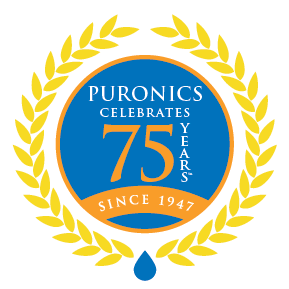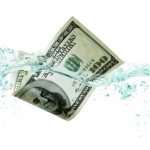Last Updated on August 26, 2021
According to the United States Geological Survey, 85% of the U.S. has hard water. But what is hard water, and what makes soft water preferable? Let’s break down hard water vs. soft water, how they are different and how you can soften your water.
What is Hard Water?
Hard water is water that contains a significant amount of calcium and magnesium. The term comes from the fact that it does not mix well with soap, making it “hard” to wash anything. Hard water is measured in grains per gallon (gpg). A gpg is defined as 1 grain (64.8 mg) of calcium carbonate dissolved in 1 gallon (3.8 L) of water. This is equal to about 17.1 mg/L or parts per million (ppm). If your water has 1-3.5 gpg it is slightly hard, 3.5-7 is moderately hard and 7-10.5 is hard. Anything above 10.5 gpg is considered very hard.
Why is Hard Water Bad for You?
Hard water is not generally considered a health risk, but it can affect your life in many ways — most notably the impact on your hair, skin, laundry and appliances. When combined with soap, it forms a scum instead of a lather, so you have to use extra soap, shampoo, detergent and other cleaning supplies. The soap scum also doesn’t rinse off well, so it sticks to your hair and skin when you bathe. This results in dry, itchy skin and unhealthy, drab hair. The soap scum also gets stuck between the fibers of clothes washed in hard water, making them wear out more quickly. Hard water also leaves spots on every surface it touches.
Your plumbing and appliances are affected as well. When heated, the minerals in hard water stick to the inside of pipes, fixtures and tubing. Over time, this “scale” builds up and causes a variety of issues that lead to more frequent repairs and replacements. Water heaters with scale buildup require more energy to heat the water.
Hard Water vs. Soft Water
Soft water is water that has less than 1 gpg of hardness. When water falls from the sky, it contains no minerals; it picks up these minerals as it travels through the earth. Areas where chalk, limestone and marble are abundant tend to have the hardest water.
Soft water easily forms a lather with soap. With soft water, you can use up to 50% less soap compared to washing with hard water. Soap rinses away easily, leaving you with smooth skin and healthier hair. Hard water strips away natural oils, but soft water doesn’t. This means you need less lotion and conditioner.
Independent studies have shown that you can use 50% less detergent in washing machines and save energy by washing clothes in cold water while still getting the same, or better, cleanliness. A study also showed that you can use half the detergent in dishwashers and get the same cleaning results.
With soft water, appliances and fixtures maintain their efficiency and flow rate much longer. Pipes without scale buildup last longer as well, reducing costly replacements. Hard water affects water heaters especially negatively. According to one study, some tankless water heaters using hard water only lasted a little over a year and a half.
How to Soften Water
The most efficient way to soften water is by using a salt-based water softener which contains ion exchange resin. The resin is made up of tiny plastic beads that have a negative charge. Sodium or potassium ions bind to the resin because they have a positive charge. When hard water flows through the resin tank, the calcium and magnesium ions switch places with the sodium or potassium ions because they have a stronger positive charge. Since there are no more hardness minerals in the water, and it now contains less than 1 gpg, it is considered soft. After a while, the resin becomes full of calcium and magnesium and needs to be regenerated. Depending on the softener you choose, different control valves have different ways of telling the system when to regenerate.
How Can you Tell the Difference Between Hard and Soft Water?
There are a few telltale signs of hard vs. soft water. One of the easiest ways to know if you have hard water in your building is through buildup. When there is a lot of scale buildup on, for example, the bottom or sides of your tub or shower, this may be an indication that you have hard water. However, some other signs of hard water may be less perceptible. Some people notice a slightly unpleasant taste in their drinking water, or residue on dishes or faucets. You can read about some common water problems here, or even schedule a free consultation to see how we can fix your water issues.
© Copyright 2021 Puronics, Inc. All rights reserved.

 Puronics, Incorporated
Puronics, Incorporated




Thank you for explaining that soft water can help you to use fifty percent less soap than with hard water when washing. I’ve been noticing that washing my hands can take longer because the soap won’t lather well. I’ll be sure to look into getting a water softener soon to see how well it helps.
I’m glad you mentioned that soft water helps appliances be more efficient for much longer. I would like to get a water softener. It seems like it would be a good idea for me to find a business that can install a filter in my house.
It’s good to know that with soft water you can use 50% as much soap. I would really like to learn more about home water softeners. My neighbor got one about a month ago, and she said it’s been a huge gamechanger for her home.
I had no idea that hard water can affect your hair and skin in negative ways. I’m tired of cleaning hard water stains out of my bathroom, so I’d like to invest in a water softener for my home. If it makes my skin healthier, that’d be great too!